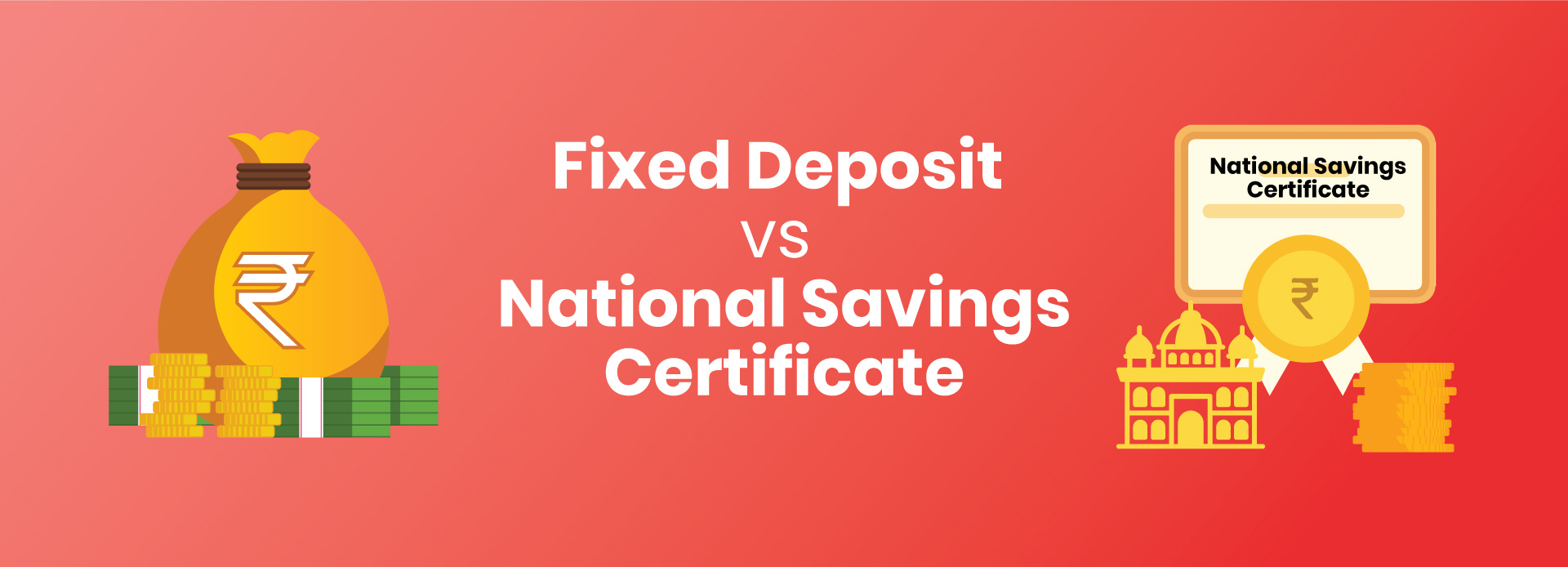
Fixed Deposit Vs National Savings Certificates - Know the Difference
28 June 2024 | By INDIE
Investors usually seek investment options that are tax-efficient, safe, and offer high returns to reach their financial goals. But before choosing, you should learn about the different investment options available. Two of the numerous investment options available are fixed deposits (FDs) and National Savings Certificates (NSCs). These options offer guaranteed interest payments and safety of capital. Continue reading this blog on NSC vs FD to know which option can help you reach your financial goals.
What are NSCs?
Offered by the Indian Government, you have to visit the post office to start your NSC. The minimum investment amount for NSC is ₹100. But, there is no cap on the maximum amount you can invest in this scheme. NSCs have a lock-in period of 5 years, and you cannot extend their tenure. If you want to hold your certificate’s lock-in beyond five years, purchase a fresh certificate at the current interest rates. NSCs have a fixed interest rate throughout their tenure. Furthermore, the principal amount and the earned interest from the NSCs are eligible for an 80C deduction. Here are some pros and cons of an NSC:
Pros:
Here are some benefits of NSCs:
● The interest and investment amount are tax-exempt under Section 80C of the Income-tax Act, 1961.
● They don’t have a maximum investment amount, while you must invest at least ₹100 at minimum.
Cons:
● A reinvestment option does not exist. You have to opt for a new certificate when the tenure of your current NSC ends.
● You still have to visit national banks and post offices physically to buy these certificates. You can’t buy them online.
Now let’s look at the other side of the Fixed deposit vs NSC debate, FD.
What are FDs?
An FD or fixed deposit enables you to invest in a lump sum with a bank at a fixed interest rate for a specific period. One can deposit your money in an FD for a tenure ranging between 7 days to 10 years. Once the fixed deposit matures, you can withdraw your investment amount with the interest.
Pros:
● You can access FDs easily across public and private banks. You can also activate your FD online.
● They also offer higher returns than savings accounts. Moreover, FDs offer guaranteed returns throughout the investment tenure.
● You can renew your fixed deposit automatically. You don’t even have to visit the bank physically.
Cons:
● The interest is taxable according to your income tax slab rate.
● Fixed interest rates mean that returns might not be helpful at times of inflation.
Also Read: How is a Fixed Deposit better than other investments?
FDs vs NSCs:
“FD or NSC, which is better?” you ask. The table below will provide a clear picture of NSC vs FD:
Features |
NSCs |
FDs |
Liquidity |
The NSCs don’t have high liquidity. |
FDs offer higher liquidity. |
Interest Rate |
Interest rates fall between 8.5% to 8.8%. |
Fixed deposits have an interest rate of 8.50%. |
Compounding Frequency |
The interest compound annually. |
The interest for FDs usually compounds quarterly. |
TDS |
They are not applicable. |
FDs have a 10% deduction on the interest. |
Minimum Investment Amount |
The minimum investment amount for NSCs is ₹100. |
The minimum investment amount relies on the bank. |
Maximum Investment |
NSCs don’t have a maximum investment amount |
Like NSCs, FDs also don’t have an upper limit for investing. |
Lock in period |
The lock-in tenure is between five to ten years. |
The lock-in period ranges between seven days and ten years. |
So, there is no clear answer to the question “NSC or FD, which is better?” because both these options offer appealing facilities. Therefore, assess your financial goals, investment horizon, and risk appetite before choosing one of these options. You can contact financial advisors to learn about these two options and to prepare an investment strategy. All the best for your investment journey.
Disclaimer: The information provided in this article is generic and for informational purposes only. It is not a substitute for specific advice in your circumstances. Hence, you are advised to consult your financial advisor before making any financial decision. IndusInd Bank Limited (IBL) does not influence the views of the author in any way. IBL and the author shall not be responsible for any direct/indirect loss or liability incurred by the reader for making any financial decisions based on the contents and information.




